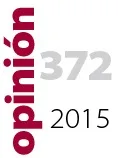Syria: Another Foolish War on Terror?

D.L.: B-8439-2012
The terror attacks of 9/11 cost less than $1million to organize. The resulting “war on terror” has come with a price tag close to $5 trillion and counting. Yet it has little to show for and its high profile interventions have been at best futile (Afghanistan) or outright disastrous (Iraq).
Europe has not learnt much from this experience. The understandable wrath in the wake of the Paris attacks and the need to fight the Islamic State in Iraq and Syria (ISIS) has prompted French President Hollande to commit a grave mistake when declaring “war” on a mafia franchise, which would be better fought by police work, intelligence agencies and counter messaging.
Most of the perpetrators of Paris and earlier attacks were European citizens who became radicalized in Europe and were able to obtain the weapons for their attacks on the European black market. They took inspiration from ISIS and other terrorist organizations and received training during journeys to the Middle East, but logistical support from there was hardly indispensable for the attacks. Terrorist threats will persist, even if the territorial ambitions of ISIS were to falter. Sooner or later they will, even without Western air attacks, as a limited economic base will erode the political appeal of the group.
Europe is entering a war in Syria without clear targets, partners on the ground or exit strategy. Without ground troops, air attacks alone will not be enough, as the cheerleaders of intervention admit. The West is not ready to commit such ground troops and there are no credible local allies with aligned interests. Kurdish troops come closest, but they will not take the fight to ISIS beyond their respective territories and neither should they, given the delicate sectarian politics of the region. The barrel bombing Assad regime is the very source of this conflict and most of its civilian casualties. It has abetted the rise of ISIS and has entertained tactical alliances with it. It did so to counter other rebel groups and appear as the better alternative internationally. In the wake of the Paris attacks this strategy might even work out as Hollande’s visit to Assad’s ally Putin shows, yet Europe should be careful not to be drawn into a realpolitik alliance with a discredited regime that is unlikely to ever regain the necessary strength to impose stability over the whole Syrian territory.
That leaves the elusive search for “moderate” rebels. The $500 million program of the US to train such rebels yielded “four to five” rebels as a US general revealed in a Senate hearing in September. Shortly after the program was abandoned. Trained fighters had no interest to put the fight against ISIS over a toppling of the Assad regime. Some of them handed over their equipment to the Nusra Front, an Al Qaeda affiliate. Many of the Syrian rebel forces are of a Salafist persuasion that is hardly more palatable than ISIS.
The interests of Turkey and the Gulf states who support these groups are not well aligned with those of the West. Turkey has also granted leeway to ISIS in order to contain Kurdish aspirations on its southern border, which it could have policed much more vigorously. The Gulf states’ sponsorship of jihadist forces in Syria and elsewhere in the Middle East has played a destabilizing role in the region. Their fear of Iran and its perceived influence in the region has prevented them from taking more decisive action against ISIS. Iran, the third major regional power, is not in the Western camp and has played an equally questionable role with its support for the Assad regime, even though some common ground exists in the fight against ISIS in Iraq.
As long as nobody really prioritizes ISIS, the group can find its niche in a divided region. Any success will crucially depend on the engagement of the three regional powers and Russia.
If boots on the ground from local allies are unlikely, the West is cautious to provide them for good reasons. Initial military success might be swift, but then what? To seize and hold all ISIS territory a prolonged presence of at least 100,000 troops would be necessary. Control will likely be elusive as the disastrous Iraq war experience shows. Freed of the necessities to provide public services on its territory ISIS or any successor organization could focus on its core business of jihadist terror. After years of attrition the West would be forced to leave without tangible results.
Defeat of ISIS will need to come from the people of the region. It will critically depend on a political peace process within Syria and the three regional powers of Turkey, Iran and Saudi Arabia forging compromises. The West can assist this process with diplomatic pressure and incentives. It can help stabilizing the situation in neighboring countries via aid. It can offer military support and air cover for some groups like the Kurdish Peshmerga forces. It can also haste the economic demise of ISIS via limited bombardments of critical infrastructure like oil installations.. Beyond that it should be wary to get overtly involved and upgrade ISIS as an organization by declaring “war” on it. The West should limit its engagement to containment.
No such restraint should be exercised on Europe’s own territory where the recent attacks have occurred. A zero tolerance policy towards Islamist groups, hate preachers and their support groups should be implemented, laws on gun smuggling tightened and cooperation between intelligence agencies improved. At the same time marginalized communities should be better integrated and Europe’s Muslim citizens be protected from right wing retribution and racist prejudice. They should feel encouraged to celebrate the diversity of their faith within the confinements of Europe’s constitutional frameworks. The successful integration of a secular Euro Islam in the open societies of Europe will likely prevail over an Islamist death cult that has the Middle East in its grip.
Eckart Woertz, Senior Research Fellow CIDOB